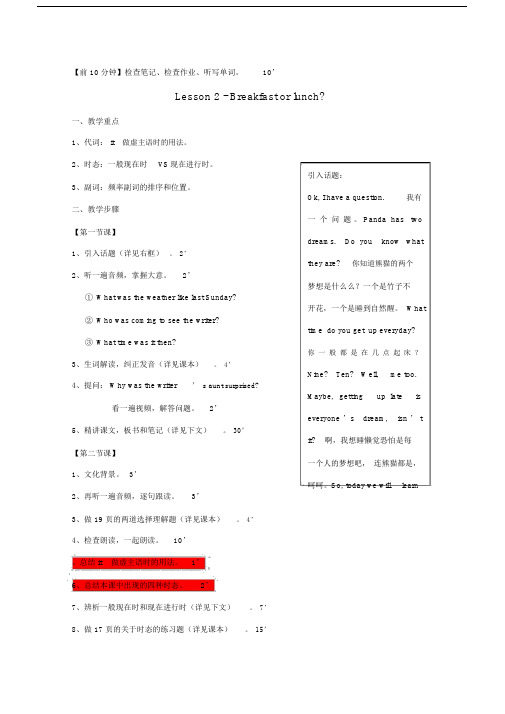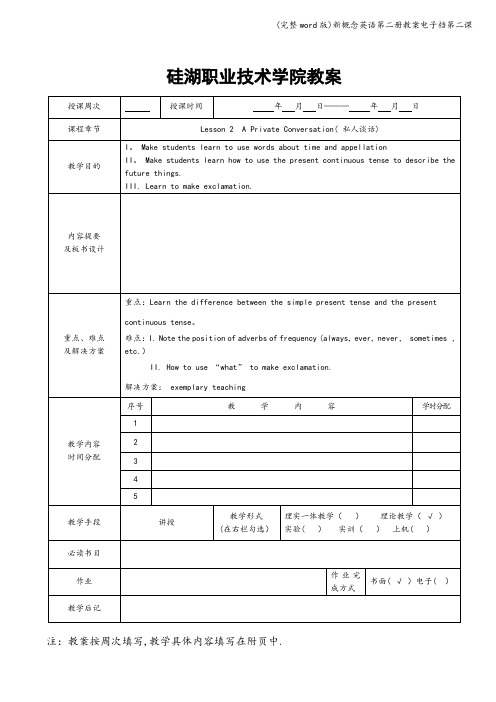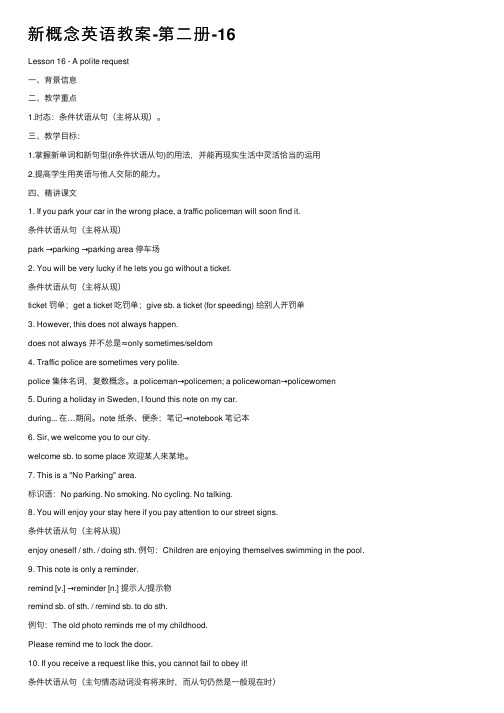新概念英语第二册教案详解
新概念英语第二册-第二课

'I'm having breakfast,' I repeated. ‘___D__e_a_r _m_e____,' she said. 'Do you always get up __so__late? It's one o'clock!'
新概念英语第二册-第二课
10. Dear me! ☆天哪!表惊讶。 还可以说:M__y_g_o_o_d_n_e_s_s_!; __G_o_o_d__H_e_a_v_e_n_s!_____; __M__y_d_e_a_r_!____; ___M_y__g_o_d_!________
新概念英语第二册-第二课
翻译下列句子: 你很快就要离开吗?_A_r_e_y_o_u__le_a_v_in_g__s_o_o_n_?______ 他今晚要去剧院看戏。 _H_e_’s__g_o_in_g_t_o_t_h_e_t_h_e_a_tr_e__th_is__e_v_e_n_in_g_.________ 将要在5分钟后到达。 _T_h_e__tr_a_in__is__a_rr_iv_i_n_g_in__5_m__in_u_t_e_s.
v. (铃、电话等)响起
aunt [ɑ:nt] n.
n. 姑,姨,婶,舅母
repeat [riˈpi:t] v.
v. 重复
新概念英语第二册-第二课
B.The text: Breakfast or Lunch
新概念英语第二册-第二课
新概念英语教案_第二册第二课完美版.docx

【前 10 分钟】检查笔记、检查作业、听写单词。
10’Lesson 2 - Breakfast or lunch?一、教学重点1、代词: it做虚主语时的用法。
2、时态:一般现在时VS现在进行时。
引入话题:3、副词:频率副词的排序和位置。
Ok, I have a question.我有二、教学步骤一个问题。
Panda has two 【第一节课】dreams. Do you know what 1、引入话题(详见右框)。
2’they are?你知道熊猫的两个2、听一遍音频,掌握大意。
2’梦想是什么么?一个是竹子不①What was the weather like last Sunday?开花,一个是睡到自然醒。
What②Who was coming to see the writer?time do you get up everyday?③What time was it then?你一般都是在几点起床?3、生词解读,纠正发音(详见课本)。
4’Nine? Ten? Well,me too.4、提问: Why was the writer’ s aunt surprised?Maybe, getting up late is 看一遍视频,解答问题。
2’everyone ’s dream, isn ’ t 5、精讲课文,板书和笔记(详见下文)。
30’it?啊,我想睡懒觉恐怕是每【第二节课】一个人的梦想吧,连熊猫都是,1、文化背景。
3’呵呵。
So, today we will learn 2、再听一遍音频,逐句跟读。
3’3、做 19 页的两道选择理解题(详见课本)。
4’4、检查朗读,一起朗读。
10’、总结 it做虚主语时的用法。
1’6、总结本课中出现的四种时态。
2’7、辨析一般现在时和现在进行时(详见下文)。
7’8、做 17 页的关于时态的练习题(详见课本)。
15’9、读绕口令游戏。
5’【第三节课】1、总结频率副词的排序和位置(详见下文)。
新概念二the best and the worst教案

新概念二the best and the worst教案教案主题:新概念二- The Best and The Worst教学目标:1. 学习并掌握形容词的最高级形式,如the best和the worst。
2. 学习并掌握最高级形式在句子中的用法。
3. 能够正确运用最高级形式进行描述和比较。
教学准备:1. 新概念英语第二册教材和相关课文。
2. 黑板、白板或投影仪。
3. 学生练习册和练习题。
教学过程:步骤一:导入(5分钟)1. 教师向学生介绍本课的主题:“今天我们将学习如何用英语表达最高级形式,比如‘the best’和‘the worst’。
”2. 教师可以通过提问学生来引入话题,例如:“你们觉得谁是你们班上最好的学生?谁是最差的学生?为什么?”3. 教师可以用黑板或投影仪展示一些图片,让学生描述并比较图片中的事物。
步骤二:学习最高级形式(15分钟)1. 教师向学生解释最高级形式的用法,并提供一些例子,如:“the best”和“the worst”。
2. 教师可以用一些形容词的最高级形式来进行示范,如“the tallest”,“the shortest”,“the biggest”等。
3. 教师可以让学生跟读并模仿这些句子,帮助他们熟悉最高级形式的语音和语调。
步骤三:练习最高级形式(20分钟)1. 教师可以让学生进行口头练习,用最高级形式描述和比较一些事物,如“Who is the best student in your class?”或“Which is the worst movie you have ev er seen?”。
2. 教师可以让学生进行书面练习,完成一些练习题,如填空题、选择题或改错题,以巩固他们对最高级形式的掌握。
步骤四:巩固与拓展(10分钟)1. 教师可以让学生进行小组活动,让他们用最高级形式比较一些事物,并在班上展示他们的成果。
2. 教师可以让学生写一篇关于自己最喜欢的和最不喜欢的事物的短文,要求他们使用最高级形式进行描述。
新概念英语第二册教学参考(教参)标准教案Lesson 2 Breakfast or lunch

全能英语标准教案The Standard Teaching Plan of Omni-courses for EnglishLesson 2 Breakfast or lunch?Step 1 Topic1. Ask the students to recite Lesson 1 together.2. Explain the title and ask the student when they get up on weekends.3. Tell the students something about the living habit of English people.It is very common for English working people to get up very late at weekends. After a week’s hard work they seem to enjoy more about their leisure time. It is also because of the high efficiency of work and living. In the same way, the shops, theatres and other public lieu always open very late at weekends, generally about 10:00am or even later. So if you get up early and want to shop around, you will see few people. Of course, London, a big cosmopolitan city, is an exception, and there are always many people at any time. As a result, the window shopping (early people will find their purchase through the big shopping windows) is popular and common around England. However, in china the shops open early on weekends to welcome more customers a day and working people would like to choose Saturday or Sunday to focus on purchasing something or just walk around.Ask the students to have a fast reading to get the general idea, and ask the students who finishes reading to put up their hands. Then may ask them to tell us what the general idea is.Step 2 General Idea结合课文四幅主图,讲解课文大意.Picture one, the writer “I” was lying in bed, enjoying my sound sleep;Picture two, finally I got up and found that it was raining outside. It was a bad day;Picture three, when I was having my breakfast, my aunt Lucy rang me;Picture four, I told my aunt that I was just having breakfast, my aunt seemed very surprised.在讲解大意其间,可以有意插入本课生词和新词组的讲解。
(完整word版)新概念英语第二册教案电子档第二课

在英语中可用what引导的感叹句来表示惊奇、愤怒、赞赏、喜悦等感情,在感叹中主谓语采用正常语序.
来源:It is a bad day. → What a bad day it is!
III. Learn to make exclamation.
内容提要 及板书设计
重点、难点 及解决方案
重点:Learn the difference between the simple present tense and the present continuous tense。
难点:I. Note the position of adverbs of frequency (always, ever, never, sometimes , etc.)
2
Discussion
1.Do you get up early every day?
2.What time do you usually get up every day?
3.Do you find it easy or difficult to get up?
4.When do you usually get up on weekends?
介词on一般用于表示某一天的时间短语中:on Monday,on Monday morning,on that day
当使用last,next,this,that时,介词(以及定冠词)必须省略:
我下周(这周)来见你。I’ll see you next/this Friday.
3。I sometimes stay in bed until lunchtime.
新概念英语教案-第二册-16

新概念英语教案-第⼆册-16Lesson 16 - A polite request⼀、背景信息⼆、教学重点1.时态:条件状语从句(主将从现)。
三、教学⽬标:1.掌握新单词和新句型(if条件状语从句)的⽤法,并能再现实⽣活中灵活恰当的运⽤2.提⾼学⽣⽤英语与他⼈交际的能⼒。
四、精讲课⽂1. If you park your car in the wrong place, a traffic policeman will soon find it.条件状语从句(主将从现)park →parking →parking area 停车场2. You will be very lucky if he lets you go without a ticket.条件状语从句(主将从现)ticket 罚单;get a ticket 吃罚单;give sb. a ticket (for speeding) 给别⼈开罚单3. However, this does not always happen.does not always 并不总是≈only sometimes/seldom4. Traffic police are sometimes very polite.police 集体名词,复数概念。
a policeman→policemen; a policewoman→policewomen5. During a holiday in Sweden, I found this note on my car.during... 在…期间。
note 纸条、便条;笔记→notebook 笔记本6. Sir, we welcome you to our city.welcome sb. to some place 欢迎某⼈来某地。
7. This is a "No Parking" area.标识语:No parking. No smoking. No cycling. No talking.8. You will enjoy your stay here if you pay attention to our street signs.条件状语从句(主将从现)enjoy oneself / sth. / doing sth. 例句:Children are enjoying themselves swimming in the pool.9. This note is only a reminder.remind [v.] →reminder [n.] 提⽰⼈/提⽰物remind sb. of sth. / remind sb. to do sth.例句:The old photo reminds me of my childhood.Please remind me to lock the door.10. If you receive a request like this, you cannot fail to obey it!条件状语从句(主句情态动词没有将来时,⽽从句仍然是⼀般现在时)receive 接收VS 接受acceptlike this/that 像这样/那样的obey sth./to do sth. 遵守…例句:We should obey the rules.fail sth. / in doing sth. 在某事上失败。
新概念英语第二册Lesson50教案
Lesson 50 Taken for a ride 乘车兜风【New words and expressions】生词和短语★ride n 旅行trip(出差性的)旅行travel(周游世界性的)旅行journey(陆地上的)旅行flight(空中)旅行voyage(海上)旅行tour游玩sightseeing观光游ride v 骑(车, 马)★excursion n 远足excursion n 游玩, 郊游(距离不会很远)weekend's excursion 周末游Tomorrow we will have (a day's excursion 一日游)★conductor n 售票员(在火车上称为列车员)★view n 景色sight n 景色, 视线, 视野in one's view=in one's opinion就某人看来view n 景色(主观性较强)sight n景色, 视线, 视野(强调客观)Can I have a room with a good view?【课文讲解】love doing/like doing强调一种习惯, 喜欢做某事I love my brother, but I don't like his girlfriendI love having dinner with you, but I don't like paying for dinnergo on an excursion (固定短语)=have an excursion :go on 可译为“进行” take花费take sb some timeEg. :My trip took me a long time.it 形式主语It takes sb some time to do sthIt takes sb some time that...It took me a month to learn book 2Sb. spend some time doing sthEg. :I spent a month learning Englishsb spend some time on sth金钱上的花费cost, pay for sth.than I expected【口语化】比我所预料的The question is easier than I expected.You are greater than i expected.You are more beautiful than i expected.You are better than i expected.Than I thought比我原以为的The holiday took you longer than I expected.The English class took me longer than I thought.Where it is [] 注意单词的连读, 音标以元音音标结尾, 字母以“re” 或“er” 结尾的, 会与下一个元音之间加“r” 这个音.get on the bus上车get off the bus下车I will tell you where you can(should) get off.I will tell you where to get off语法结构:特殊疑问词+to+动词原形可用来取代宾语从句How can I get there?can you tell me how I can get therecan you tell me how to get therecan you tell me how I should do ?can you tell me what to do?I don't know which to choose.I wonder when to have a meeting.Can you tell me how to begin a letter?【语法精粹】P231、Did you find out____the pie out of oven?a to takeb have takenc when to taked being takenfind out 发现pie馅饼oven火炉take sth out of 取出来answer :cDid you find out when we could(can)take the pie out of oven?你发现什么时候才能把馅饼从烤箱中拿出来了吗?In the front of /in front ofThe :特指, 范围in the front of前者属于后者的范围in front of前者不属于后者的范围The teacher stands in the front of the classroom.The teacher stands in front of the students.to :表目的get a good view of 欣赏......的美景I stood at the window to get a good view of the city.after some time=after a timelooking round, .........现在分词或过去分词做状语, 那么这个动作必然与主句主语相关1、非谓语动词做状语, 这个动作必然与主句主语有关-ing与主句主语构成主动关系-ed 与主句主语构成被动关系to do与主句主语构成目的关系2、如果非谓语动词做定语, 只与被修饰词相关, 与主语无关passing plain路过的飞机ploughed field耕过的地3、如果-ing/-ed做宾补, 与宾语有关I find the door locked (被动, 门被锁)I realized with a shock that...I do sth with an excitementwith+n 表示状态that引导宾语从句left放在被修饰词之后on the bus / in the bus :表示在火车上, 汽车上既可以用“in” 又可用“on” as far as we go 我们能够走的一样远This is as far as I can do.as far as + 从句; 最大程度地, 最大限度地as far as we go=we couldn't go any moreI can't bear(it any more).。
新概念英语2的教案
新概念英语2的教案教案标题:《新概念英语2》教案教案目标:1. 帮助学生掌握《新概念英语2》教材中的基本语法、词汇和句型。
2. 培养学生的听、说、读、写的综合能力。
3. 培养学生的学习策略和自主学习能力。
教学重点:1. 学习并掌握教材中的重要词汇和句型。
2. 培养学生的听力和口语表达能力。
3. 培养学生的阅读理解能力。
4. 提高学生的写作水平。
教学难点:1. 学生对英语语法的理解和应用。
2. 学生对英语听力的理解和运用。
3. 学生对英语阅读的理解和归纳能力。
教学准备:1. 《新概念英语2》教材及配套教辅材料。
2. 录音机或多媒体设备。
3. 单词卡片、图片等教具。
4. 多媒体课件。
教学过程:第一课时:1. 导入:利用图片和实物引导学生进入学习状态,复习并教授与课文相关的单词和短语。
2. 听力训练:播放课文录音,要求学生仔细听并回答问题。
3. 语法讲解:针对课文中的语法点进行讲解和练习,如一般现在时的肯定句和否定句等。
4. 句型练习:利用课文中的句子进行口语练习,鼓励学生进行对话练习,并纠正他们的发音和语法错误。
5. 课文阅读:学生独立阅读课文,理解文章内容并回答相关问题。
6. 课堂练习:布置练习题,巩固学生对课文的理解和掌握。
第二课时:1. 复习:通过复习上节课的内容,检查学生对课文的理解和记忆。
2. 听力训练:播放课文录音,要求学生根据听到的内容填写相关信息。
3. 语法讲解:针对课文中的语法点进行进一步讲解和练习,如一般过去时的肯定句和否定句等。
4. 句型练习:利用课文中的句子进行口语练习,鼓励学生进行对话练习,并纠正他们的发音和语法错误。
5. 阅读理解:学生独立阅读与课文相关的短文,并回答相关问题。
6. 写作练习:要求学生根据课文内容,写一篇关于自己的经历的短文。
7. 课堂练习:布置练习题,巩固学生对课文的理解和掌握。
第三课时:1. 复习:通过复习上节课的内容,检查学生对课文的理解和记忆。
2. 听力训练:播放课文录音,要求学生根据听到的内容进行判断正误。
新概念英语教案第二册70课
Lesson 70 Red for danger一、教学重点1、复习书信写作二、教学步骤1、引入话题(详见右框)。
2’2、听一遍音频,掌握大意。
5’①Did a drunk suddenly wander into the middle of the ring during a bullfight?②Did the bull ignore the matador?③Why did he step aside?3、生词解读,纠正发音。
10’4、提出问题:Why did the crowd cheer?看一遍视频,解答问题。
3’5、精讲课文,板书和笔记(详见下文)。
20’1、做319页的两道选择理解题。
5’2、朗读课文。
10’3、复习句型(详见下文)。
10’4、做317页关于句型的练习。
15’5、绕口令。
10’【第三节课】1、讲解318页的难点。
10’2、听写单词,记忆法指点。
10’3、听英文歌曲。
8’4、看图背课文比赛。
20’5、总结本课重点,让学生标注(详见上文)。
1’6、布置作业:摘要写作,319页的选择题,背课文和单词。
1’三、单词讲解1. ★bullfight. n. 斗牛(活动)like a red rag to a bull令人暴怒的事物bully n. 恃强凌弱的人coward n.懦弱者Coward die many times before their death; the valiant never taste of death but once. bullfighter = matador 斗牛士bulldog斗牛犬2. ★drunk1. n. (口)醉鬼drunkard n. 酒鬼,酒徒2. adj. (因感动高兴等)沉醉的,陶醉的(表语)drunk with sth. 因某事陶醉,飘飘然drunken adj. 酒醉的,酒醉引起的(行为)醉汉a drunken man酒驾drunken driving3. ★wander v.1. 溜达他溜达进来似乎无事可做He wandered in as if he had nothing to do.2. 溜号absent –minded;离题She ~s in her conversation.她的谈话杂乱无章Don’t ~ off the subject—keep to the point3. 迷路,迷途(常加off)The climbers ~ed off in the mountains.4. ★ring1. n. 圆形竞技场bullring, circus ring,2. n. 环,戒指a wedding ring, an engagement ring, ring-finger3. v. 打电话= call电话响了10分钟The telephone has been ringing for 10 minutes.5. ★unaware adj.be unaware of 不知道,没有察觉他没察觉到危险He was unaware of the danger.他没察觉到身处危险之中He was unaware that he was in danger.★aware adj. 知道的,注意到的I became aware how she might feel.She is a politically aware woman.她是一个政治意识敏锐的女人6. ★remark1. n. 备注, 注意, 评论make a remark about/on就…之事说话,…评论,批评…make remarks陈述,提意见2. v. 说出(意见感想)(比say正式)“Money is the most important thing.” He remarked ironically remark on/upon7. ★apparently = obviouslyapparent adj.1.显然的It is apparent to sb that…很明显他在对我们所有人撒谎It was apparent to all of us that he was lying2. 表面上的an apparent advantageIn spite of her apparent indifference, she was warm-hearted.尽管表面上漠不关心(实际上)她是个热心肠8. ★sensitive adj. 敏感的,神经过敏的,易生气的,介意的(常与to+名词连用)Mary is sensitive to smells.Mary has a sensitive ear.sensitive skinYou should not be so sensitive to criticism★sensible adj.1. 明智的,有判断力的a sensible man 通晓事理的人2. 可感觉到的noticeablea sensible difference词根sense n. 意识;感觉sense of humora man of good sensecommon sense9. ★criticize v. 批评,评论她总批评她朋友自私She’s always criticizing her friend for being selfish.词根critic n. 批评家, 鉴定家a critical writer 评论家,a critical essay评论a critical situation 危机状况★charge v. 冲上去①vt. &vi. 要价,收费They charged us too much for repairs.How much do you charge for this dress?②vt. 指控,指责The police charged him with murder.He charged Gary with speeding.③vt. &vt. 猛攻,冲向,冲锋,向前冲The bull charged at the drunk.10. ★clumsilyclumsy adj.He is clumsy with/at using chopsticks.11. ★bow v. 鞠躬①vt. &vt. 鞠躬,欠身,低下(头等)bow sb. in/out 鞠躬迎入/送出As she couldn’t answer the question, she bowed her head.②vi. 让步,屈服,服从Why did you bow to their decision?He finally bowed before money and married the other girl.③vt. 压弯,压倒My mother is bowed with age. 我母亲因年老而腰弯背驼。
新概念儿童英语第二册教案:What’syourname?
这篇关于新概念⼉童英语第⼆册教案:What’s your name?,是⽆忧考特地为⼤家整理的,希望对⼤家有所帮助!⼀、教学内容和要求(Teaching contents and demands)项⽬内容要求词汇 six, ten, nice, meet, 0⼀、教学内容和要求(Teaching contents and demands)项⽬内容要求词汇 six, ten, nice, meet, too, Miss, him, talk, me 能听懂、会说、会认读并能根据中⽂拼写出英⽂else, OK 能听懂、会说、会认读语⾔结构 1. —Are you Meg?—Yes, I am. / No, I’m not.2. —What’s your name?—My name is ....能理解、掌握和运⽤这些结构交际⽤语 1. Who else is at home?2. Let him talk to me. 能听懂、会说,并能⽤来进⾏会话⼆、教学重点和难点(Key points and difficult points)1. 词汇(Words)⽂中出现的Miss⼀词通常⽤作未婚⼥⼦姓名之前的称谓语或已婚⼥⼦因职业关系等特有的称谓语,如:Miss Li(李⼩姐), Miss Kelly(凯丽⼩姐), the Miss Hills(希尔家的⼩姐们),其中M要⼤写。
另外还可以直接⽤miss(Miss)表⽰⼩学⽣对⼥教师的称呼,如:Good morning, miss(Miss). (⽼师,您早!)其中的M既可以⼤写也可以⼩写。
else意思是“另外的, 其他的, 别的”,常接于疑问词或不定代词之后,例如:what else, somebody else, anything else等等。
2. 语⾔结构(Structure)本课重点学习主系表结构,包括询问姓名、年龄时⽤到的陈述句、⼀般疑问句及其肯否回答、特殊疑问句等。
- 1、下载文档前请自行甄别文档内容的完整性,平台不提供额外的编辑、内容补充、找答案等附加服务。
- 2、"仅部分预览"的文档,不可在线预览部分如存在完整性等问题,可反馈申请退款(可完整预览的文档不适用该条件!)。
- 3、如文档侵犯您的权益,请联系客服反馈,我们会尽快为您处理(人工客服工作时间:9:00-18:30)。
新概念英语第二册教案详解
Corporation standardization office #QS8QHH-HHGX8Q8-GNHHJ8 § Lesson— 1 A private conversation 私人谈话 【New words and expressions】 生词和短语 ★private adj.私人的 如果妈妈想看你的信, 你可以说 : It's my private letter. 如果陌生人想进你的房子, 你可以说 : It's my private house. private life 私生活 由此引申出privacy n.隐私 : private life 私生活 It’s privacy.这是我的隐私!(不愿让别人知道的) private school(私立学校), 与此相反, 公立学校是public school.所以, private的反义词是public.
公众; public letter 公开信; public place 公共场所 private还有一个值得注意的意思 : 普通的. 如 : private citizen 普通公民:I’m a private citizen. private soldier 大兵; 我们熟悉的《拯救大兵瑞恩》就是《Private Ryan》 ★conversation n.谈话 subject of conversation : 话题(天气是英国人最喜爱的话题) 几种谈话 : 1、talk 内容可正式可不正式, 也可以私人 : Let’s have a talk. 2、conversation 一般用于正式文体中, 内容上往往不正式: They are having a conversation.
3、dialogue 对话, 可以指正式国家与国家会谈 : China and Korea are having a dialogue.
4、chat 闲聊, 就是北京人说的 “侃” , 说的是无关紧要的事. 5、gossip 嚼舌头, 说长道短 have a + talk/chat/dialogue/conversation/gossip 名词变动词 ★theatre n.剧场, 戏剧 cinema: 电影院 ★seat n.座位 这个词很重要, 考试常考. have a good seat,这里的seat指place(指地点不错), 而不是chair. take a seat/take your seat 坐下来, 就坐 下面这个句子在口语、电影里很常见 : Is the seat taken(这个位置有人吗) 请坐的3种说法 : Sit down,please.(命令性) take your seat,please. Be seated,please.(更礼貌) 考点 : 作为动词的seat与sit的区别 sit--vi; seat—vt eg: He is sitting there.他住在那儿. You seat him.你给他找个位置. seat sb 让某人就坐,后面会加人 eg: seat yourselft. Seat him. 〖语法精粹〗 all those present(到场者)_D_ he began his lecture.(重点题) seaed sit,sit down; seat,be seated;take a seat ★play n.戏 ★loudly adv. 大声的 ★angry adj. 生气的 cross=angry ; I was was cross. annoyed: 恼火的; 程 I was annoyed. 度 I was angry/cross. 加 I was very angry. 深 be blue in the face : I am blue in the face.(脸色都青了, 相当生气了) ★angrily adv. 生气的 副词修饰动词 ★attention n. 注意 Attention ,please. 请注意(口语) pay attention :注意 pay attention to : 对什么注意 You must pay attention to that gril. pay a little attention :稍加注意 pay much attention :多加注意 pay more attention :更多注意 pay no attention :不用注意 ★bear(bore,borne) v. 容忍 bear,stand I can't bear/stand you endure :忍受,容忍 put up with :忍受 I got could not put up with him bear/stand/endure 忍受的极限在加大 put up with=bear=stand bear n.熊 white bear bear hug :热情(热烈)的拥抱 give sb a bear hug ★business n. 事, 生意 business man :生意人 do business: 做生意 go to some place on business:因公出差 I went to Tianjin on business. thing 可以指事情,也可以指东西 business:某人自己的私人的事情 It's my business (指私人的事, 自己处理的事) it's none of your business ★rudely adv. 无礼地, 粗鲁地 rude adj. 【课文讲解】 Last week go to the theatre see a film=go to the cinema go to the +地点 表示去某地干嘛 go to the doctor's 去看病 go to the dairy 去牛奶店 go to the + 人 + 's 表示去这个人开的店 go to the butcher's 买肉 go to school: 去上学 go to church: 去做礼拜 go to hospital(医院):去看病 go to the Great Wall go home; 跟home相连一定表示没有事情可做,回家休息 I am at home 在家休息 enjoy, enjoy oneself:玩的开心 enjoy+sth :喜欢,从当中得到一种享受 I like something very much./I love something. I enjoy the class. I enjoy the music. I enjoy the book. enjoy the dinner/film/progeam/game were sitting :当时正座在 过去进行时态 :过去的某个时间正在发生的动作 一个故事的背景往往用进行时态描述 I+be+v(ing) The girl was reading a book in the boy came to her. got :变得,表示一种变化,got angry I am/was angry 是一个事实 I got angry:强调变化过程 It is hot. It got hot. got取代be动词,got是一个半联系动词,可以直接加形容词 说话的时候喜欢用缩略.I'm not,he isn't,they aren't 写的时候会说:I am not,he is not,they are not I didn't do sth,I did not do sth hear:听见 hear+人:听见某人的话 I could not hear your pardon I couldn't hear you./I couldn't hear a word./I couldn't catch your word. I couldn't hear you clearly./I couldn't catch your words. Beg your pardon /I couldn't catch your words. turn round:转头 not pay any attention = pay no attention 表示注意,pay attention; 对什么加以注意,pay attention to sth not any=no I could not bear it./you./the noise. I can't hear a word. hear a word : a word 等于一句话 He didn't say a word. May I speak to Jim/May I have a word with Jim It's none of your business./None of your business/It's my business. I couldn't bear you. This is private conversation! private :私人的,不想与别人共享 I can't hear a word. hear a word of sb (actors) Key stuctures : 关键句型 Summary writing : 摘要写作 answer this questions in not more than 55 words. 【Key structures】 关键句型 Word order in simple statements: 简单陈述句的语序
